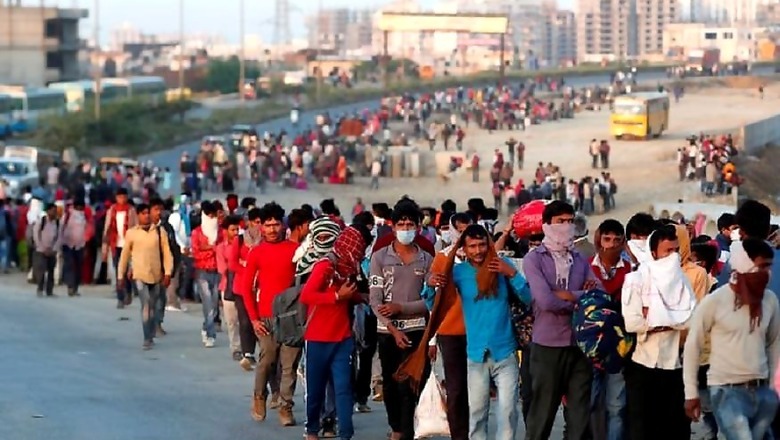
views
The immediate problem that has overwhelmed India is the movement of millions of migrant labourers who are now crossing state borders to reach their villages. Specific interstate transit bus terminals (ISBT) across the country are crumbling under the weight of the migrant daily wagers wanting to go home. This has created an unprecedented situation as the coronavirus pandemic is now on the move. So many people at one spot, all clustered and crowded in a location, is also creating new hotspots for the virus.
To understand the enormity of the problem, the Economic Survey 2017 estimated that 90 lakh people moved between states annually for five years between 2011 and 2016. The total number of internal migrants in the country (accounting for inter- and intra-state movement) is a massive 13.9 crore (139 million).
The inter-state movement has source states and destination states. Uttar Pradesh and Bihar are the biggest source of migrants, followed by Madhya Pradesh, Punjab, Rajasthan, Uttarakhand, Jammu and Kashmir and West Bengal. The major destinations for migrants are Delhi, Maharashtra, Tamil Nadu, Gujarat, Andhra Pradesh and Kerala. The media focuses on Delhi, but it’s happening in other destination states and cities as well. What Delhi is witnessing is inter-state migration to Uttar Pradesh and adjoining border states and Delhi has the second largest migrant population after Maharashtra. The movement is to Uttar Pradesh, Uttarakhand and Punjab. There is an intra-state migration from cities to village across all states also and it’s not being monitored or tested. The coronavirus is on the move.
The reason for the migration is two-fold — first is fear of coronavirus and second is the loss of jobs in the informal sector. The migrants cannot feed their families, pay their rents or survive in the city due to the lockdown hitting jobs in construction, manufacturing, restaurants, travel and house help.
The fear factor can only be allayed if Prime Minister Narendra Modi conveys it in a manner that only a good communicator can do. Losing jobs and economic crisis is not something that can be addressed immediately because of the lockdown. Hence, people will continue to leave the cities, the de-urbanisation because of the virus will happen even if the fear recedes. It can only be controlled with testing, and the treatment needs to shift.
The state governments cannot handle this situation on their own or from the central command structure. The source states have neither the capacity nor capability to address such a massive number of people. Hence, this is an urgent appeal to state and central bureaucracies to hand over the ISBT to Indian Army’s Army Services Corp (ASC). It’s the only organisation in the country that has the capability to organise, move and support movement at a short time on a war footing. In parallel, the response for the management needs to be the delegation to district level, as the epidemic gets diffused and distributed from cities to the hinterland.
Let us not forget that this is a war, a different war that this world has never seen before. The enemy is invisible, incognito, and striking every single citizen. This is bio-terrorism at its worst and none of the traditional scenarios of disaster management will work. The base of disaster management scenarios is on a geographical area getting affected, and the rest of the country working towards providing relief and support to it.
Although the government has classified it as a national disaster, it still depends on the state department machinery to address its aftermath. The movement and distress of migrants changes this completely. Even if one crore or 10 million such migrants move from cities, it will create havoc with the health system.
Every one of them is a potential carrier of the virus and is carrying it now to a distant, remote village where there is no health service. This means the epidemic just exploded geographically. The lockdown has failed to contain it in cities as the virus will travel to the villages. Villages where there is no testing, no hospitals, and no ventilators. This is a disaster which could have been averted if the district collectors were involved in the lockdown from day one instead of engaging them later after the decision was made centrally.
The movement of migrants changes the scenario. The disaster is now distributed across the country —the ISBTs and inter-state border between economically well-off states and poor states, the new hotspots for #Coronavirus. The state cannot address this distribution and dispersion process anymore. It needs to recognise, accept and respond immediately.
It is important and urgent that all inter-state transit points be handed over by the Indian Army, specifically to the Army Services Corp (ASC). The ASC provisions, buys and distributes supplies to the Army, Air Force and, when required, for the Navy and other para-military forces. It is the logistics arm of the army and is capable of moving both people and goods in an orderly manner.
The movement at the new hotspots has to follow a strict protocol. First is the availability of transportation that’s sanitised for an orderly dispersal. Second is food and temporary logistic at the hotspots. Third is hospitalisations and testing facilities at these hotspots.
The hospitalisation and testing facilities need to be with the Army Medical Corps (AMC), in coordination with the district administration, to prepare for the deluge and volume of tests and hospitalisation. The control and command from the central and state capital needs to diffuse to the district administration level so that the response is quick.
The system cannot handle or address these issues on its own, it needs the support of the civil society and communication is the key here. Time to act was yesterday. The decision to delegate authority to district level has to happen now.
(The author works with a think tank in New Delhi. Views expressed are personal.)




















Comments
0 comment